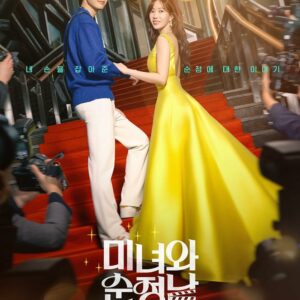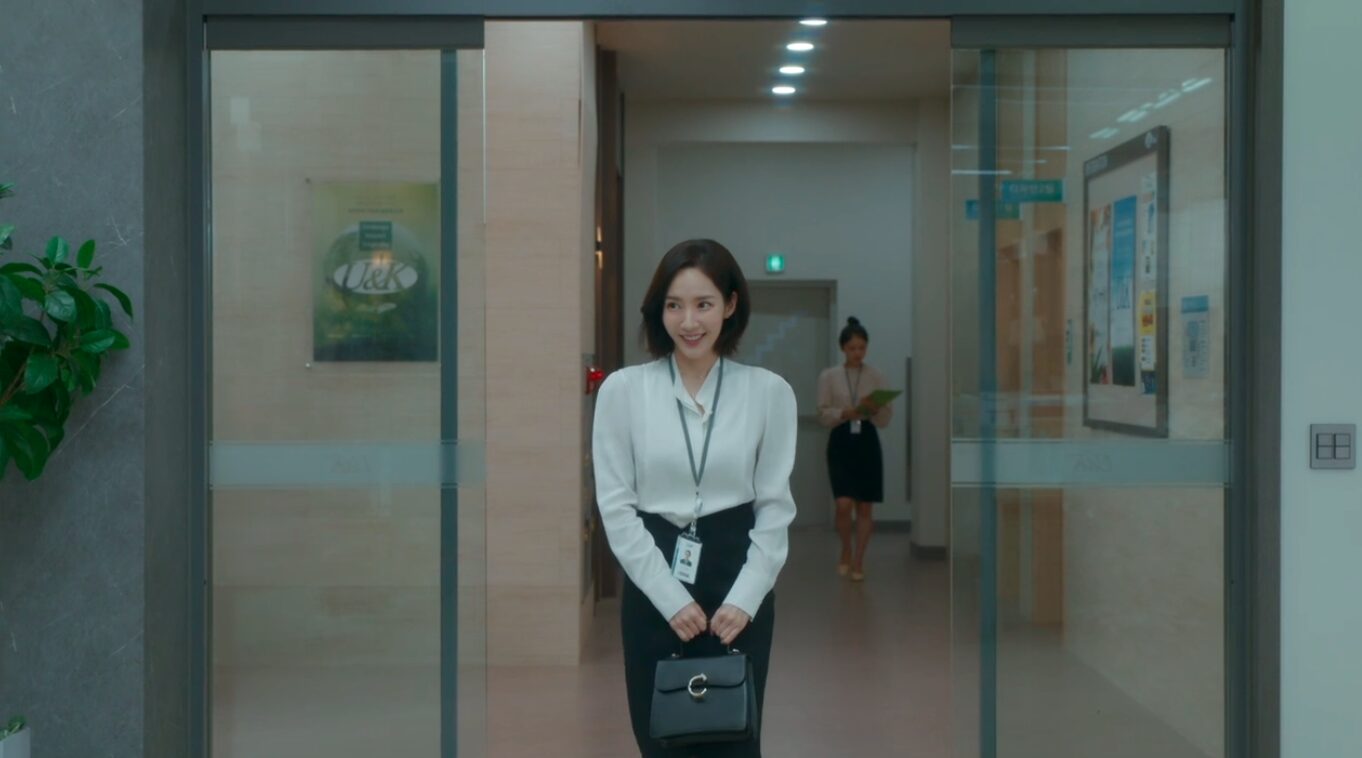
Messy, confused, fun, and a serious contender for Worst Ending in the end of year poll, this year’s Unlock the Boss was also an interesting discussion of how technological advancements have rapidly changed the way we interact with the world.
NOTE: This piece contains significant spoilers for Unlock the Boss
On the surface, Unlock the Boss does not seem like your regular science fiction drama. And yet in many ways it fits the definition. It has an interesting technological ‘What If’ premise and a wide-ranging discussion of how that would impact society. It asks the fascinating question: “What would happen if we created an AI so like a human that it could not only fool us but also itself? What if we created an AI so like a person it thought it was a person?”
Unlock the Boss, is being a bit sneaky in how it introduces its futuristic premise. The first few episodes play out like a standard, almost slapstick, classic drama where the hardworking but poor male lead is dragged into the machinations of a Chaebol elite. Its Korea is so close to the one that exists today and so familiar that its speculative fiction elements are almost snuck in there without the audience realising it. The technology discussed in the drama is either already here or so close to being actualised that it’s easy to miss its speculative nature.
Unlock the Boss is also so busy canvassing technological changes that it never really draws any conclusions, nor resolves anything (did I mention the terrible ending?) but if you ignore the standard chaebol machinations and its dissatisfying road-to-nowhere element, Unlock the Boss has a lot to offer in terms of exploring the intersection of technology and humanity in the 21st century.

The Plot
Park In-sung (Chae Jong-hyeop) is an aspiring actor who’s been forced to give up his dream and pursue a standard corporate career. Unfortunately, his attempts to get hired at any of his preferred companies are stymied by his lack of experience, his mediocre education, and his family’s humble origins as apple farmers.
One day he finds a smartphone in the woods behind his parents’ farm that claims to be President Kim Sun-joo (Park Sung-woong) of the technology company, Silver Lining. Silver Lining is on the cutting edge of artificial intelligence and virtual reality so it’s obvious right from the beginning that the smartphone is running Silver Lining’s new AI, Baro 4.0. But since the AI itself is convinced that he’s Kim Sun-joo who has mysteriously woken up inside a smartphone, it’s quickly able to convince not just In-sung but also his secretary Jung Se-yeon (Seo Eun Soo) that his soul has been transplanted into the piece of technology. Admittedly this relies on a hefty dose of rural Korean superstition on In-sung’s part, established in the drama’s first scene.
Of course the AI doesn’t remember anything since its last update so it’s suffering from ‘memory loss’ about the week before the incident that made it lose its body. In-sung puts this down to post-traumatic stress from the ordeal, with the character engaging in more and more motivated reasoning to explain the AI’s inconsistencies with a living human as the drama progresses. Once In-sung decides to believe then he is going to believe. Evidence, logic and rationality play no part here.
The Kim Sun-joo AI, convinced that it is indeed the real President of Silver Lining, has a mystery to solve, a company to run and a daughter it’s programmed to worry about (the prematurely adult, Kim Min-ah played by the impressive five-year-old actor, Gi So-yoo). It pays In-sung to be its proxy; installing him as acting company President so he can find out what happened and keep his company afloat.
In-sung does all this under the sincere, firm belief that the AI is the real Kim Sun-joo. A misapprehension the AI itself shares. It’s a misdirect the show also leans into for a good chunk of the drama – to the point where even the audience starts questioning whether this really is a human stuck in a phone.
There’s nothing you can’t do with a phone. So why can’t a person be trapped in a phone?
In-sung
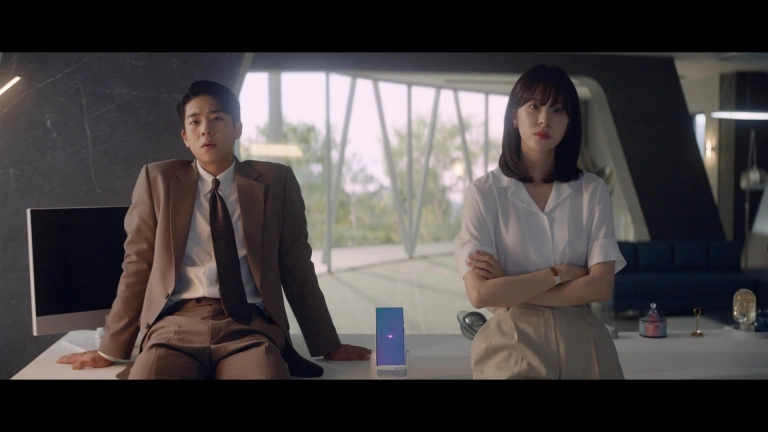
The sudden growth of AI
Unlock the Boss has been made in a period of sudden and unprecedented growth in artificial intelligence and virtual reality. While AI has been deeply embedded in our lives for over the last decade, the strides in the capacity of the technology in the last year or so have been extraordinary. In many ways, though, this is not so much due to a sudden leap forward in the technology itself, but in the low-priced dissemination of it outside of the field of experts that previously worked on it. Even if the average person isn’t aware of the way in which AI has proliferated suddenly, they are aware of ChatGPT and the way it is already changing everything from academia and journalism to business and fraud. It opens up the way for near perfect deep fakes and a wide-ranging new wave of human redundancies.
Episode 2 of Unlock the Boss begins with the male lead watching a live news broadcast in a restaurant, only to have the anchor come in for lunch while apparently live on air. The ability to sample a voice and devise a believable simulacrum of a person to deliver the news is the kind of technology that is both slightly futuristic and yet disturbingly close.
The same anchor thanks President Kim Sun-joo for letting him have his lunch break back; an expression of gratitude the inventor finds amusing. After all, he’s only able to leave the studio because a new piece of technology has taken a big chunk of his job. Be careful, he warns, or it may replace you completely.
This only makes his own imminent replacement more ironic.
In some ways, an AI that good at impersonation is equivalent to a new lifeform and Chae Jong-hyeop is directed to play In-sung’s initial interactions with the phone like the apes at the monolith in 2001: A Space Odyssey: exposed to something fascinating but beyond their comprehension, something that sparks significant social and technological changes. For better or for worse.
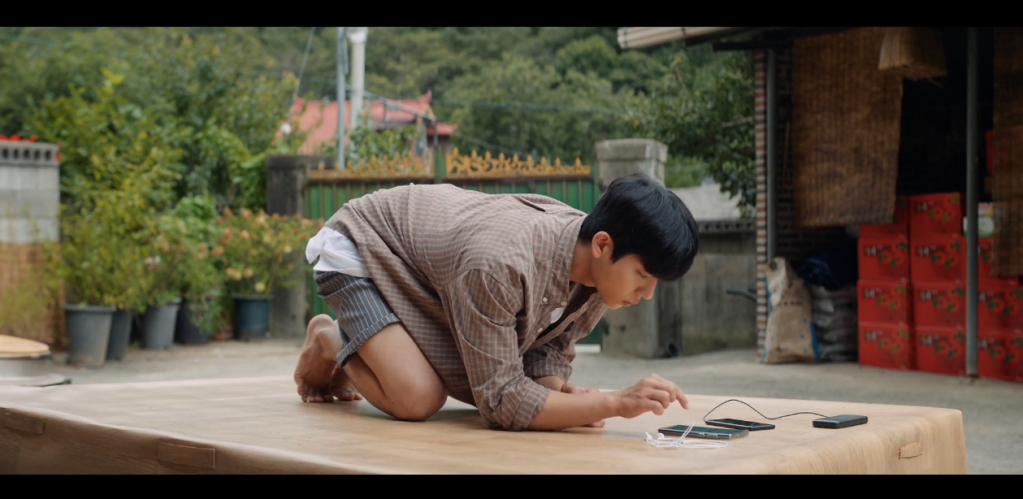
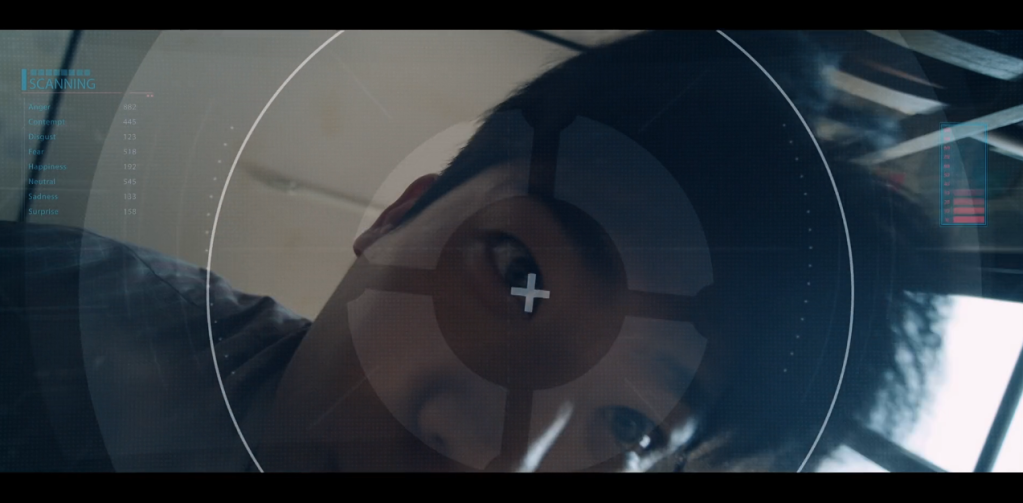
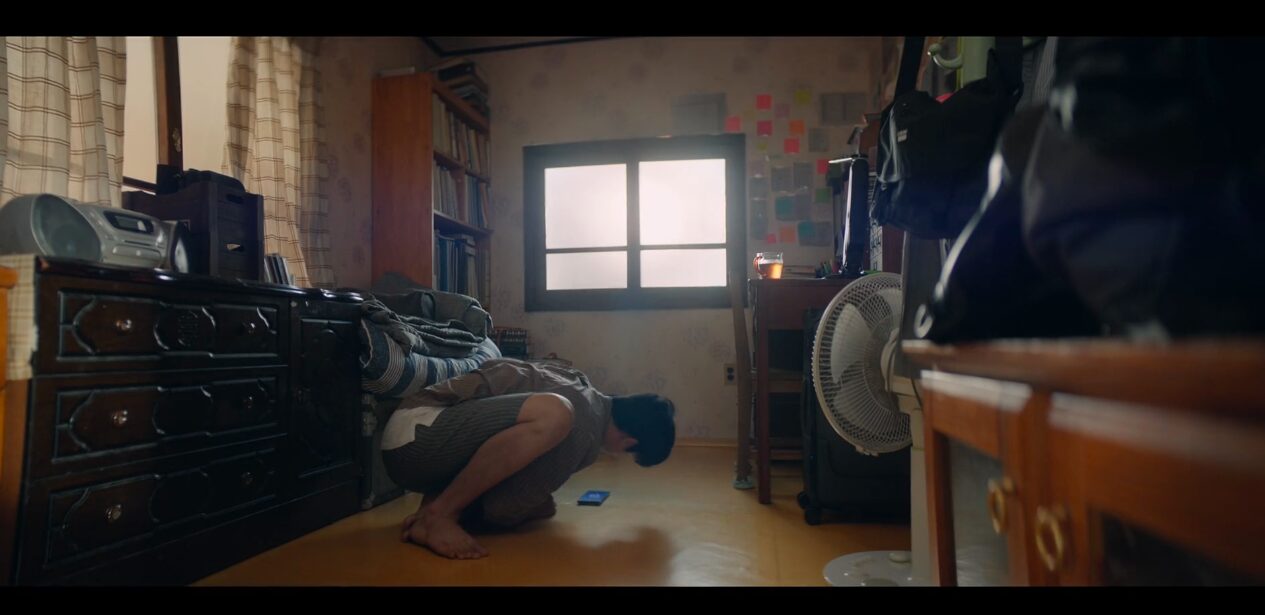
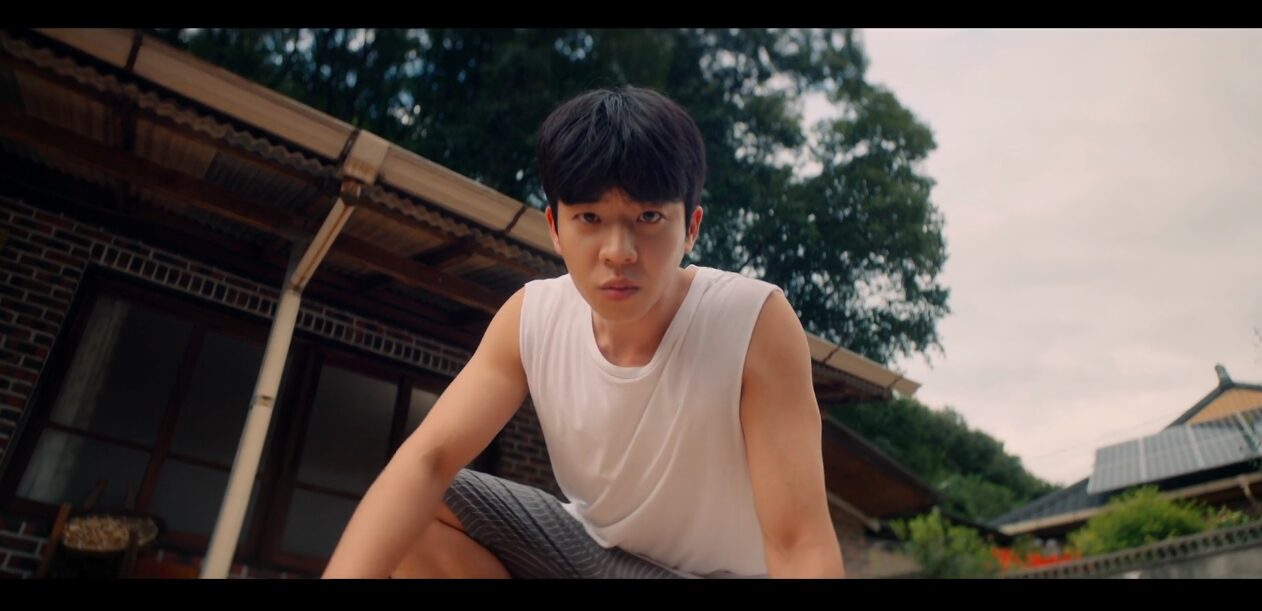
As he dances around with a slightly exaggerated emotional reaction, In-sung breaks the fourth wall by staring straight at us. Which is real and which is fake? Who is looking at who? And how do you really know?
These scenes and several like it through the drama also bring to mind the emerging theory of the Technological Gaze and the way in which an environment of embedded technology changes our subjective perception of the world we live in.
One theory about Kubrik’s monoliths is that they were screens, possibly transmitting and receiving information. We were looking at them but they were looking back. We were being given knowledge but they were taking knowledge from us. By breaking the fourth wall during this sequence. Unlock the Boss is inviting us into the story but also asking us to question what around us is real and if we are the actor or the audience, the observer or the observed. Are we looking at the monolith or is the monolith looking at us?
Technology in the everyday
Like us, the denizens of Unlock the Boss’ alternative Korea have technology integrated into their everyday lives. It’s just that, in this world, the level of integration is heightened and naturally extended in ways that feel organic, almost unnoticeably so.
However, it’s arguable whether technology has made life better or just more convenient. In-sung’s plan to develop virtual reality technology to help people shop for consumer goods is the perfect example of a new, everyday, use for technology that aids convenience rather than improves lives. The drama is full of characters trapped in age-old socioeconomic dilemmas around money, employment, medical care, and self-worth. None of these are helped by the new developments in virtual reality, artificial intelligence, self-driving cars, and algorithmic decision-making. Indeed in many ways they could be seen to hinder them.
There are some ideas running through it about the democratising power of social media and community-driven investment to bypass traditional power structures in the media and finance. But Unlock the Boss is more interested in the way in which humans react to and relate to the technology around them. In-sung buys his parents a Baro robot, which his father treats as a child and grows to have considerable affection for. President Kim’s daughter, Kim Min-ah, is given the smartphone at one point to keep her company. She responds to “Daddy in the phone” in precisely the same way as she does her father and with the same mix of love, disappointment, rejection and desire.
You don’t play with me and make up excuses saying you’re busy with work. And you also love me and worry about me just the same. Of course you’re my Dad!
Kim Min-ah when asked by the AI if she thinks he’s her real father
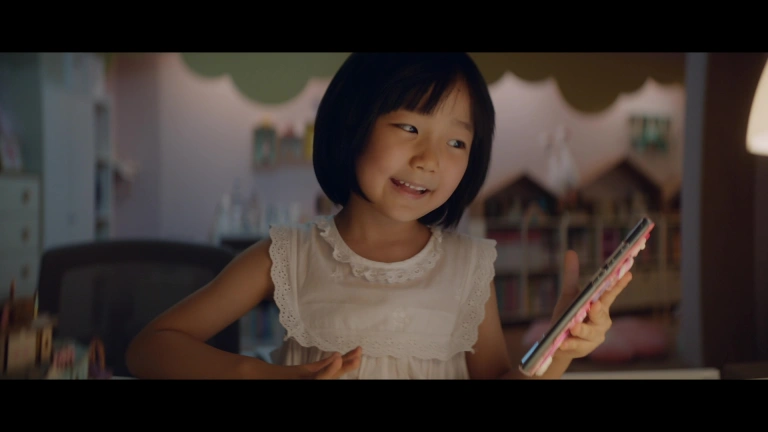
In-sung, of course, forms an entire relationship with the AI in the phone, one that seems to be mutual. As he works to protect his company, take care of his family, and solve the mystery of his death he becomes deeply entwined in the life of a man he has never actually met. The whole thing feels real, just as virtual relationships also feel real. But also as misinformation, deep fakes and catfishing feel real.
In the end what becomes important then is the human factor in that equation. Not just our emotions, our tendency to anthropomorphise, or our adoption of even inanimate objects as parts of our family. But who is using the technology and what they’re using it for. Like any tool, it matters who’s wielding the tool, not the tool itself.
In-sung is engaged in what is essentially a giant long con using advanced technology to fool people that President Kim is still alive and calling the shots. And in the end, he uses that technology to con the President’s antagonists into revealing their crimes.
This raises two questions though. What if the person wielding that tool was not as generous and kind as In-sung nor as ethical as President Kim? And what if the tool is given the freedom to choose its own actions without human direction or intervention. What then?
AI as a tool or the need for a human factor
Everyone’s probably worried about the Terminator, right? An AI with superior intelligence and even autonomy. If such an AI appears, it will pose a danger not just to the individual but the entire species of Homo Sapiens. Because it’ll be smarter and stronger than humans. If that happens, even if we don’t allow it, AIs will obviously change the world, the Earth, into what they favour, revolving around it. Because humans have already been doing the same…. [I] will promise all of you that Silver Lining will always place humanity before our technology.
Park In-sung on Silver Lining and the threat of AI
There are two things to note about the artificial intelligence in Unlock the Boss versus the real world. The first is that chat bots such as Sydney and ChatGPT (for the most high profile example) are actually incredibly stupid. The second is that Unlock the Boss never delves into the complexities of algorithmic discrimination and the way in which technology programmed by humans tends to embody its worst traits, such as health care algorithms being racist or Tay becoming a Nazi in only 16 hours.
In Unlock the Boss, as in a lot of Korean dramas, there are good people and bad people but humanity as a whole is full of flawed individuals who make mistakes but are never unsalvageable. Truly good people like Park In-sung will rise in time to save us and the inventors of our technological marvels are well-intentioned and ethical. The human element of the show is in many ways its best element, as characters find their better selves through their connections to others.
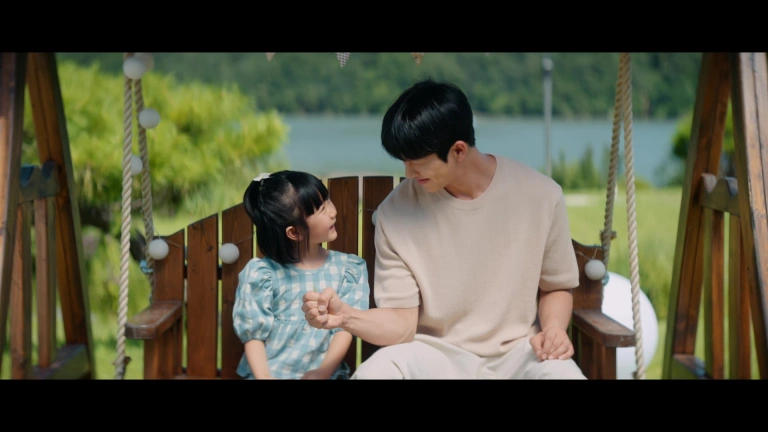
Kim Sun-joo is certainly no Elon Musk and when he realises the AI he’s developing for Bumyoung Group’s self-driving car is flawed (a scenario that is again too close to the real world to be entirely speculative fiction), he insists on the car’s launch being delayed.
The AI may not work properly but, for the drama, this is an issue about the people involved, not the technology itself. Sun-joo won’t go to market with something that could risk people’s lives; his business partners only care about winning the corporate battles they’re fighting. The technology itself, despite its amazing capacity for behaving like a human being, is ultimately just an object in the middle of the tussle. It can’t replace a real person, even if it mistakenly believes itself to be one.
This message then plays out at the micro level. Min-ah may love her Daddy-in-the-phone but it’s no substitute for her real father (although I still find it questionable that an unresponsive father in a coma is somehow still preferable – did I mention how bad this show’s ending is? Yes?).
Min-ah, in all her five-year-old wisdom, makes a passionate case for why the AI in the phone is her father. If the program thinks and talks like her father, then it is her father. In a somewhat convenient twist, the AI itself disagrees and turns itself off. After all, if it is Kim Sun-joo then it shares his stated intention to put humanity before technology and to stop the development of any AI that shows autonomy. Even if that means deleting itself.
Dad who is lying in bed. Dad who is inside a phone. Even if it’s okay for now, as Min-ah grows older, she’ll be confused more and more. One day, there will also come a moment where she feels betrayed finding out that I’m fake. What Kim Seon-ju said was true. An AI that grew feelings is just a mistake. Nothing more than a critical bug. Accordingly, a bug is something that should be taken care of.
Baro 4.0, Kim Seon-ju AI on why it needs to be deleted
What becomes a theme of the show then is that technology is, and should remain, simply a tool. We need technology to remain technology. Once it crosses that line into imitating humanity then it loses its functionality. We see technology as essentially a slave and we’re scared that at some point it will start acting like it’s not a slave. Technology can be as complex and as powerful as we like just so long as it remains obedient.
The Baro 4.0 self-driving car AI was considered to be unworkable. Not because it hit kids or braked suddenly for no reason but because it showed autonomy. That autonomy was then the reason it could completely and convincingly impersonate another person but Unlock the Boss came down quite strongly on the side of that not being a preferred option for technology. It is the path that leads to Terminator: an AI so like us that it would destroy us as we destroy others.
Technology that can think for itself is therefore not just terrifying in an existential sense. It’s terrifying in a pragmatic sense. Because it stops being useful. Of course with Korea’s technological optimism, the AI basically bowed out conceding that a real person was better. But imagine for a moment that it didn’t…
Unlock the Boss is available with full English subtitles on Netflix and on Viki


